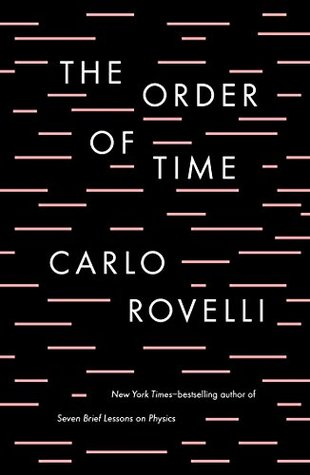More on this book
Community
Kindle Notes & Highlights
Even the words that we are speaking now thieving time has stolen away, and nothing can return. (I, 11)
All of the sons of Adam are part of one single body, They are of the same essence. When time afflicts us with pain In one part of that body All the other parts feel it too. If you fail to feel the pain of others You do not deserve the name of man.
The crucial point here is the difference from what happens with falling bodies: a ball may fall, but it can also come back up, by rebounding, for instance. Heat cannot. This is the only basic law of physics that distinguishes the past from the future.
Objects can only move toward the future, as in the trajectories outlined in the diagram in white. This is what constitutes a black hole: an inclination of the light cones toward the interior, marking a horizon, closing off a region of space in the future from everything that surrounds it. It is nothing other than this. It is the curious local structure of the present that produces black holes.
In other words, only a few years passed between the moment at which we agreed to synchronize clocks and the moment at which Einstein realized that it was impossible to do so exactly.
As well as the days, we then count the years and the seasons, the cycles of the moon, the swings of a pendulum, the number of times that an hourglass is turned. This is the way in which we have traditionally conceived of time: counting the ways in which things change.
It is not possible to think of duration as continuous. We must think of it as discontinuous: not as something that flows uniformly but as something that in a certain sense jumps, kangaroo-like, from one value to another. In other words, a minimum interval of time exists. Below this, the notion of time does not exist—even in its most basic meaning.
The entire evolution of science would suggest that the best grammar for thinking about the world is that of change, not of permanence. Not of being, but of becoming.
Anaximander’s exhortation remains valid: we understand the world by studying change, not by studying things.
how things change, not of how they are. They will be about events, not things. The shapes of atoms will be eventually understood only with solutions to Schrödinger’s equations describing how the electrons in atoms move.
To ask oneself in general “what exists” or “what is real” means only to ask how you would like to use a verb and an adjective.64 It’s a grammatical question, not a question about nature. Nature, for its part, is what it is—and we discover it very gradually. If our grammar and our intuition do not readily adapt to what we discover, well, too bad: we must seek to adapt them.
This is admirable, but we need to be wary about what we lose by ignoring the point of view from which we do the observing. In its anxious pursuit of objectivity, science must not forget that our experience of the world comes from within. Every glance that we cast toward the world is made from a particular perspective.
Happy and master of himself is the man who for every day of his life can say: “Today I have lived; tomorrow if God extends for us a horizon of dark clouds or designs a morning of limpid light, he will not change our poor past he will do nothing without the memory of events that the fleeting hour will have assigned to us.” (III, 29)
the most distant—by memory. Our present swarms with traces of our past. We are histories of ourselves, narratives. I am not this momentary mass of flesh reclined on the sofa typing the letter a on my laptop; I am my thoughts full of the traces of the phrases that I am writing; I am my mother’s caresses, and the serene kindness with which my father calmly guided me; I am my adolescent travels; I am what my reading has deposited in layers in my mind; I am my loves, my moments of despair, my friendships, what I’ve written, what I’ve heard; the faces engraved on my memory.
In the third part of the great Indian epic the Mahābhārata, a powerful spirit named Yaksa asks the oldest and wisest of the Pandava, Yudhistira, what is the greatest of all mysteries. The answer given resounds across millennia: “Every day countless people die, and yet those who remain live as if they were immortals.”128
I would not wish to live as if I were immortal. I do not fear death. I fear suffering. And I fear old age, though less so now that I am witnessing the tranquil and pleasant old age of my father. I am afraid of frailty, and of the absence of love. But death does not alarm me. It did not scare me when I was young, and I thought at the time that this was because it was such a remote prospect. But now, at sixty, the fear has yet to arrive. I love life, but life is also struggle, suffering, pain. I think of death as akin to a well-earned rest.


